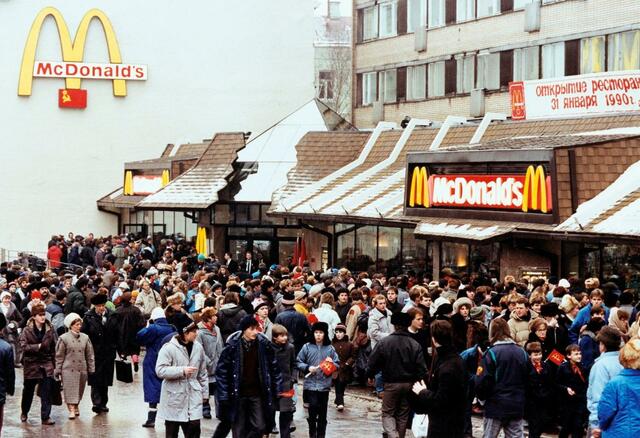McDonald’s has withdrawn from Russia, and it seems that many Russian citizens have bid farewell.
However, the 850 McDonald’s restaurants in Russia that were closed represent only about 2% of all McDonald’s restaurants in the country.
On the other hand, Japan, with more than 2,900 McDonald’s restaurants, more than three times the number in Russia, is one of the largest McDonald’s countries in the world.
It remains to be seen whether McDonald’s in Japan, which has made a complete comeback with the Corona disaster in the face of Russia’s complete withdrawal, will maintain its strong performance in the after-Corona era.
McDonald’s Pulls Out of Russia Following Russia’s Military Invasion of Ukraine

A number of companies have decided to withdraw from Russia in protest against Russia’s military invasion of Ukraine.
Among them, McDonald’s withdrawal from Russia became a major topic of discussion.
McDonald’s had about 850 stores in Russia, but closed all of them on March 13, 2022.
McDonald’s entered Russia in 1990 after the collapse of the Soviet Union.
The first McDonald’s restaurant in Moscow received a great welcome.
However, after 32 years, McDonald’s had to pull out, and it seems that the closing day came amidst the crowds of Russians who were bidding farewell.
Russia accounts for only about 2% of the total number of McDonald’s stores worldwide
As of December 2021, McDonald’s operates 40,031 stores worldwide.
Of these, 847 are in Russia, which, even if all stores were closed, would account for about 2% of all stores.
Therefore, McDonald’s withdrawal from Russia will not cause much damage to the company.
For reference, the following is a ranking of McDonald’s store openings by country.
- 13,438 stores in the U.S.
- China: 4,395 stores
- Japan: 2,941 stores
- France: 1,517 stores
- Canada 1,452
- Germany 1,432
- K. 1,367
- Brazil 1,052
- Australia: 1,023 stores
- Russia 847 stores
The number of stores opened in Russia is not that large, only about 2% of the total.
This is why McDonald’s was able to quickly decide to withdraw from Russia.
Japan, which has been overtaken by China, ranks third in the world in terms of the number of stores.
In recent years, McDonald’s has been aggressively opening stores in China, where it has already surpassed Japan to become the world’s second largest restaurant operator.
However, Japan’s 2,941 store openings are far ahead of the 1,517 openings in fourth place, France.
The United States, China, and Japan are McDonald’s three largest regions for store openings.
In terms of population per store, Japan has one store per 43,000 people (population 126 million), while China has one store per 320,000 people (population 1.43 billion).
However, in terms of familiarity with McDonald’s, the ratio of population per McDonald’s restaurant is much closer in Japan than in China.
The U.S., with 24,000 people per outlet (320 million population), is indeed the closest to home.
McDonald’s Japan has completely overcome the chicken problem. Will it continue its rapid growth in the after-Corona era?
In 2014, McDonald’s customers in Japan plummeted after the use of expired chicken in McDonald’s McNuggets was discovered.
More than seven years later, after the Corona disaster, McDonald’s Japan has made a full recovery.
While domestic restaurant companies struggled with the Corona disaster, McDonald’s has maintained strong performance, partly due to the active use of online ordering, and Japanese people’s love for McDonald’s has completely revived.
It is rare for a country to be in the news simply because “the amount of imported fries used at McDonald’s has been reduced and orders for fries are now only S.”
That is how much McDonald’s is loved in Japan.
This is in contrast to Russia, where McDonald’s has completely withdrawn from the market.
The priority measures to prevent the spread of the disease will be lifted nationwide on March 21, 2022.
In the restaurant industry, after-coronas will finally begin.
It remains to be seen whether McDonald’s will continue its rapid growth in Japan in the post-Corona era.


コメント